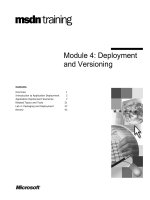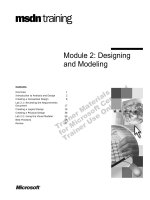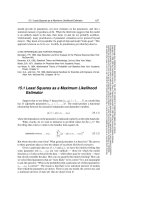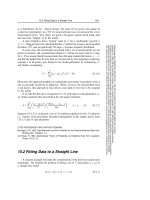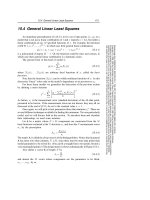Tài liệu Faculty of Economics and Business Administration Master of Banking and Finance doc
Bạn đang xem bản rút gọn của tài liệu. Xem và tải ngay bản đầy đủ của tài liệu tại đây (1.33 MB, 12 trang )
Faculty of Economics and Business Administration
Master of Banking and Finance
Master of Banking and Finance
Joining Forces to Understand the Complex Financial Dynamics 1
Why This Program? 2
Target Group 3
A Unique Combination of Advantages 4
Program Overview 5
Some Practical Information 7
Evaluation: a dynamic approach
Course schedule
Degree
Tuition fee
Admission Procedures
Teaching Staff 8
Further Information 10
Master of Banking and Finance
Table of Contents
During the last few decades the financial world has gone through a complete transformation.
Deregulation of financial markets, spurred by dramatic technological evolutions, tore down the walls
that had existed between domestic and international money and capital markets as well as between
banks, insurance companies and stock brokers. Competition became the buzzword. World-wide finan-
cial service companies began restructuring their business lines and started developing new products
and markets. In Europe, the introduction of a single currency further encouraged these developments.
Finally, the recent financial crisis showed the importance of understanding financial markets in detail
and highlighted the necessity of a solid risk management.
Undoubtedly, the entire economy benefits from these evolutions. Unfortunately, for the financial inter-
mediaries life becomes ever more complex. It is therefore no wonder that they are constantly in need
of specialised people: economists who understand the mechanics of financial markets will always be
scarce.
To accommodate this shortage the Department of Financial Economics of Ghent University introduced
advanced studies in Banking and Finance. The aim of this Master program is to provide the students
with in-depth knowledge of the latest developments in finance and banking and a thorough under-
standing of the relevant academic literature. The target group consists of economists with previous
education or working experience in the fields of finance or banking and sufficient proficiency in statis-
tics and econometrics.
The program ‘Master of Banking and Finance’ shows that the Department
of Financial Economics at Ghent University is continuously focusing on
evolutions of financial markets. By bringing together a group of moti-
vated students and teachers, and by applying dynamic and multimedia
teaching methods, the Department of Financial Economics is striving to
increase understanding about and enthusiasm for financial develop-
ments.
Joining Forces to Understand
the Complex Financial Dynamics
1
The goal of this specialised program in Banking and
Finance is to form experts who are able to perform their
analysis of financial problems and developments within
a sound theoretical and quantitative framework. Their
analysis should also enable them to work out or to adapt
existing (company) strategies.
Indeed, working in the financial sector is becoming much
more demanding, but also very exiting. The deregulation
of financial markets has opened many opportunities for
financial service companies, investors, borrowers as well
as for the government. Technological improvements in
communication and information processing have decre-
ased transaction costs dramatically, which altered the
core business of banks completely. At the same time,
these evolutions explain the huge growth rates in the
number of transactions on financial markets. Investors
have never before been confronted with such a broad
range of investment opportunities, whereas corporate
and government borrowers have flexible access to money,
being able to choose the maturity, the currency and even
the risk-profile of their financing. At the same time,
government agencies in general and central banks more
specifically can not only actively use financial markets to
steer the economy, but also learn about the expectations
of economic agents, to the extent that these expectati-
ons are reflected in the prices of financial assets.
Master of Banking and Finance
Why This Program?
2
Herman Verwilst
Former Chairman of the management committee
of Fortis Bank.
“The financial sector needs economists with a
thorough micro- and macro-financial training
and who have mastered quantitative manage-
ment techniques for modern financial service
companies. They should also be able to develop
a critical vision towards the important tenden-
cies and strategic choices in the financial indus-
try. Young people with such a profile will be the
leading executives of the future.
In my opinion, the Master of Banking and
Finance at Ghent University is the ideal program
to acqui re this knowledge and these skills.”
Of course, no benefits without any dangers – financial markets never present free lunches. Although financial interme-
diaries are undoubtedly offered many opportunities, choosing among them becomes difficult. As financial markets are
in constant move, a choice that seems to add value to the company in one scenario may well turn out to be fatal in other
circumstances. Moreover, financial organisations often have many business lines and therefore many counterparties. It
follows that a clear understanding of all the interrelationships is crucial to ascertain the risk position of the entire orga-
nisation. Likewise, a major concern of prudential authorities is that the failure of one participant will lead, through its
multiple transactions, to the failure of several otherwise sound institutions, ultimately causing a total breakdown of the
financial system. All these examples point out that risk management should be well developed on financial markets.
Thorough understanding of the complex relationships and dynamics of financial markets and institutions requires
insight in many disciplines. Knowledge about the organisation of financial markets and the mechanics of the assets
traded is not sufficient, if it is not supplemented by awareness of macroeconomic and monetary concepts. Moreover, the
quantitative nature of finance also requires a sound command of econometrics and data processing skills. It is precisely
the need of the financial community for people who are able to combine these economic, financial and quantitative
skills that led the Faculty of Economics and Business Administration at Ghent University to organise advanced studies in
Banking and Finance. This Master program draws heavily upon the expertise of the young team of teachers and resear-
chers from the Department of Financial Economics. This department groups sub-fields such as monetary economics,
banking, microeconomics of financial markets, investment analysis, financial econometrics, and risk management.
The Master program is intended for economists having some background in finance and who feel the need for a serious
in-depth training in finance and banking. Students graduating from this program will probably feel at ease in functions
or departments such as
• investmentanalysis
• riskmanagementunitsoffinancialandcorporateorganisations
• assetandliabilitymanagementunitsoffinancialintermediaries
• pensionfunds,hedgefunds
• studydepartmentofacentralbankorgovernmentagency
• financialconsultingfirms,ratingagencies
• supervisorybodiesforfinancialmarketsandinstitutions
• universityorresearchdepartments
• …
Master of Banking and Finance
Why This Program?
Target Group
3
A specialised program
All courses are specialised and advanced within the broad
field of finance and banking.
Financial insights are combined with macroeconomics and
monetary policy
Finance is not an isolated world. The interrelationships
between on the one hand finance and banking and macro-
economic policy on the other hand are studied extensi-
vely. Advanced courses in macroeconomics, monetary
economics, corporate finance and organisation of financial
markets describe the larger setting in which finance should
be situated.
You will become familiar with the most recent techniques
used in finance
All courses are strongly founded in academic research.
Students will be guided through recent academic papers
and encouraged to use the tools and models proposed to
analyse and solve real-world problems.
Thorough quantitative basis
Because of the availability of abundant data, solving finance
and banking problems often involves extensive number
crunching. Although most courses will discuss appropriate
methods to perform such analyses, an advanced course in
financial econometrics will provide the students with the
necessary background.
Enjoy interactive education and train your presentation
skills
In the Master program a lot of time will be devoted to class-
room discussion, presentations of case studies and papers,
and expositions of analyses of real-world problems. By
doing so, students will be able to train their oral and writ-
ten presentations skills. They will learn how to state and
defend their arguments as well as to (critically) evaluate
the statements of students and teachers.
Working together in applying concepts
Many assignments and cases are to be solved by teams of
two to four students. These assignments serve to better
grasp theory and to be able to handle real-world finance
problems. Because of the importance of these assignments,
as a general rule, there will be no lectures after lunch. For
most courses, the grades on the assignments will weigh
heavily on the final grades.
Excellent computer facilities
In order to be able to work in the best circumstances, the
university offers a computer room reserved exclusively
for the Master students. Besides specialised statistical and
econometric software, standard packages such as Micro-
soft Office, E-mail software, and Internet browsers are also
installed on the computers. To download data, the faculty
subscribes to Datastream Data Channel, from which most
financial and macroeconomic data can be accessed.
Opportunity to obtain in-the-field experience
The assignments prepare the students for a final graduation
project. During the last two months of the program, teams
of two students will be given the opportunity to work full-
time on a project in a financial institution or government
agency under the supervision of both the academic staff
and a company supervisor. Examples of such projects will be
made available on the website of the Master program.
Getting international exposure
In finance and banking it is important to have an interna-
tional dimension and obviously international problems will
be discussed in most courses. In addition we will frequently
invite internationally renowned guest speakers and guest
professors. For instance, we are glad that Frank Smets, who
is head of the Monetary Policy Research unit of the Euro-
pean Central Bank, has agreed to teach Monetary Econo-
mics in the Master program. Of course, also by choosing
English as the common language in this program, we expli-
citly want to attract an international student population.
Extensive professional support
Many courses are taught by members of the Department
of Financial Economics. This department hosts a young
team of professors and researchers. Their research covers
most subfields in the domain of finance and banking. More
details can be found on the Department’s website. All
teachers and researchers will be available to help students
finding their way in the world of finance. In addition, the
program co-ordinator assists students with more practical
problems.
Opportunity to spread courses over 2 years: the possibility
exists to spread the Master program over two years.
An attractive study environment
The city of Ghent hosts the largest student population of
the country; the University alone accounts for over 30,000
students, enrolled in 9 faculties. The Faculty of Economics
and Business Administration is situated close to the Medie-
val city centre. Theatres, musea and sporting facilities are
within walking distance. Student housing is comfortable
and affordable.
More information can be found on www.ugent.be
4
Master of Banking and Finance
A Unique Combination of Advantages
Master of Banking and Finance
Advanced Investments
Michael Frömmel
This course focuses on recent developments in portfolio
theory and finance, such as behavioural finance, bubbles
and globalized markets. Both the empirical testing of
theoretical models and the empirical analysis of financial
markets are discussed. The goal is to make the students
acquainted with the academic literature in these fields
and to teach them how to apply the methods introduced
in these papers to real-world problems.
Financial Econometrics
Gerdie Everaert
The aim of this course is to provide students with the
ability to recognise problems in financial economics and
to analyse these problems within the existing scientific
literature. To this respect, students are acquainted with
a number of modern econometric techniques commonly
employed in the financial literature.
An important accent in this course is to provide students
with the ability to translate the acquired knowledge to
real problems, i.e. students are required to be able to
provide solutions to practical problems in a scientifically
well-founded and creative way.
Financial Risk Management
Frank De Jonghe (Deloitte)
In this course, the pricing and the use of derivative
products is discussed. Especially the quantitative techni-
ques used for pricing and risk management will be exten-
sively covered. Next to that, in three separate sessions,
the key ingredients for the measurement of market risk,
credit risk and operational risk are introduced.
Economics of Financial Markets
William De Vijlder (BNP Paribas Investment Partners)
This course analyzes the interaction between financial
markets and the macroeconomic environment. Relation-
ships are established between various financial markets
(stocks, bonds, corporate bonds, exchange rates, commo-
dities) and economic indicators (growth, inflation, inte-
rest rates, balance of payments, central bank policies).
The objective is to investigate the consequences of these
interactions for investment decisions, both asset alloca-
tion and market timing, as well as the risk of financial
assets. Students also have to manage an asset portfolio to
translate theory into practice.
International Banking
and Financial Markets
Koen Schoors
The aim of this course is to study a widely neglected
issue: How do commercial banking systems behave under
distress? We analyse the causes of banking crises around
the world and propose methods to prevent these crises
or, if need be, to solve them. Various institutional arran-
gements are compared, ranging from deposit insurance
schemes to exchange rate arrangements. Also the inter-
national financial architecture comes under scrutiny.
Special attention goes to the analysis of a number of rela-
tively recent cases.
Management of Financial Institutions
Rudi Vander Vennet
The course intends to provide a thorough understan-
ding of the main issues and the complex interactions
in the management of modern financial services firms
(FSFs). The aim is to (1) identify important trends within
the changing environment of FSFs, including the finan-
cial crisis, (2) articulate and understand strategic issues
in financial intermediation, (3) master up-to-date analy-
tical and quantitative tools to tackle the key decisions in
FSFs, (4) propose and justify scientifically accurate and
workable solutions for real-world problems, (5) confront
evidence obtained in cases or research with the acquired
body of theoretical and empirical knowledge in the
field, and (6) critically assess competing paradigms of FSF
analysis.
Program Overview
5
Below we list a description of the courses offered in the Master program.
Governance in Financial Institutions
Herman Verwilst
This course starts from the basic knowledge about the
role of banks in the economy. The fundamentals of regu-
lation and supervision are thoroughly presented, as well
as the revealed shortfalls and the proposed adjustments.
The internal and external governance of banks is analy-
sed. The observed weakness and proposed improvements
will be discussed. Students write and defend a paper on
one of the topics.
The aim of the course is to understand the behaviour
of individual banks versus regulation, supervision and
governance, to understand the function and rationale of
public intervention in financial markets and enable the
students to solve independently and on an academic level
problems that are related to bank behaviour and bank
supervision
Monetary Economics
Gert Peersman
This course wants to give the students a thorough under-
standing of the way monetary policy is conducted and the
transmission of monetary policy signals to the rest of the
economy.
Strategy and Organisation of
Financial Institutions
Herman Verwilst
The aim of the course is to make students understand
the complex interactions in the organisation of financial
services firms, their strategy formulation and the imple-
mentation of strategic plans.
Topics in Advanced Corporate Finance
Dries Heyman
This course wants to give the students a thorough under-
standing of various important corporate finance deci-
sions; In order to achieve that, both theory and recent
empirical evidence will be reviewed. We focus on a
number of important topics: capital structure, payout
policy, corporate governance, mergers and acquisitions
and initial public offerings. Next to class work, students
will also make an empirical study on one of these topics.
Topics in Empirical Research in Finance
Michael Frömmel/Dries Heyman/Rudi Vander Vennet
The goal of this course is to accustom students with
recent empirical research in finance and banking. To this
end, researchers from universities and financial institu-
tions will be invited to share their research results and
their practical experience with the students and other
interested participants. In addition, the students will be
required to use some of the results or techniques presen-
ted in their own empirical research.
Thesis (Graduation Project)
During the last two months of the academic year (May
and June) students will be given the opportunity to work
in small teams on their thesis in a financial institution. This
will allow them to demonstrate their capacity to analyse
real-world situations in a scientifically accurate way using
the modelling techniques covered in the Master courses.
Often, they will be required to offer solutions to actual
problems and to assess potential policy implications of
such solutions. The thesis subjects are usually suggested
by financial institutions or other companies. A team consi-
sting of faculty members and employees of the company
will supervise the students while working on the thesis.
The findings will be presented by the end of June to the
supervising team.
6
Master of Banking and Finance
Program Overview
Admission procedures
Students with a Belgian university degree (2nd cycle) or a Belgian
HOLT degree (higher education of minimum 4 years of study):
People meeting this requirement are invited to take an admission test,
the purpose of which is to determine the prior knowledge of bank-
ing and finance research, of quantitative skills, and English. (Partial)
exemption of this admission test can be offered if, on the basis of the
curriculum, the individual seems to be familiar with these basics. More
information about these tests can be found on our website: http://
www.feb.ugent.be/fineco/mbf/
To apply for exemption, you should fill out the information form
(see website: and mail it to
Students with a non-Belgian degree having a second cycle acade-
mic degree:
There are 2 compulsory procedures for admission, we advise you to start
both procedures at the same time. The first procedure allows us to ascer-
tain whether the applicant has the necessary background to be able to
successfully participate to the Master program. The second procedure is
the general acceptance procedure set up by Ghent University.
Procedure 1: First of all we ask you to complete the information form
(see website: and mail it to
In order to speed up the process of application, you should also send:
1. a letter of motivation (why you would like to study advanced
courses in Banking and Finance at Ghent University)
2. your Curriculum Vitae (with copies of your diplomas and degrees)
3. two letters of reference 4. your GMAT score
The address is:
Faculty of Economics and Business Administration
Master of Banking and Finance, Lena De Cock
Tweekerkenstraat 2, 9000 Gent, Belgium
Students with a non-Belgian degree are required to take the GMAT
organised by the Graduate Management Admission Council. This test
is organised at numerous locations all over the world (see http://www.
gmac.com for additional information). When taking the GMAT, please
mention that the results should be forwarded to the Faculty of Econo-
mics and Business Administration of Ghent University (GMAT code
number 7096). Based on their curriculum and this score, students may
qualify for admission. In addition, students may be required to take
an admission test. (Partial) exemption of this admission test can be
offered if, on the basis of a strong academic curriculum, the individual
seems to be familiar with the required basics.
The admission test consists of three parts: (1) Financial Economics
(2) Investment Analysis, and (3) Econometrics and Statistics. Our
web site contains references to books suited to prepare for the admis-
sion test.
For any questions you may have with reference to procedure 1, please
contact
Procedure 2: In order to be able to register for the Master of Banking
and Finance, you MUST register at Ghent University.
For more information: />degreestudent/application
For any questions you may have with reference to procedure 2,
please contact
Evaluation: a dynamic approach
The courses in this Master program frequently use interactive
learning methods, so students are expected to participate acti-
vely. Opportunities are offered to hold group discussions, to
solve case studies, to give presentations and to discuss actual
situations with lecturers and guest speakers. In other words, the
permanent evaluation of participants is indispensable and very
important.
Course schedule
When?
The sessions take place on a daily basis, generally from 9 am till
1 pm. The afternoon will be devoted to case study preparation,
group discussion, exercises, preparation of presentations, guest
lectures, etc.
Language?
The program will be taught in English. All presentations and
reports will be in English. Consequently, a sufficient proficiency
in English is a necessary entry requirement.
Where?
All courses will take place at our campus at Woodrow Wilson-
plein 5D, Ghent — the building where also the Department of
Financial Economics is located. The room is equipped with the
necessary IT-infrastructure and the computer class for the Master
students is also in the building.
Start of the program: end of September
End of the lectures: end of April
Thesis (Graduation project): the thesis starts beginning of May
and the results will be presented to the faculty and the bank/
company by the end of June.
Examination periods: Although in most cases students will be
evaluated during the lecture weeks, for some courses a formal
examination will be organised during two weeks after the Christ-
mas holidays (first semester courses) and one week after the
Easter break (second semester courses). If necessary, a second
examination session is organised in September.
Degree
Participants who end the program successfully will obtain a
Master of Banking and Finance.
The university degree will only be granted to participants who
meet all admission requirements, attend sessions regularly,
complete the final project successfully and pass the test on the
different subjects.
Tuition fee
Currently, the tuition fee is set at 564,30. Participants
have to enrol at Ghent University. For students who wish
to follow the program on a part-time basis, tuition fee will
also be spread over two years. In addition to the tuition fee,
there are other specific costs like books, course material, use
of software, etc. We estimate this cost at approximately
400.
7
Master of Banking and Finance
Some Practical Information
Prof. dr. Michael Frömmel
Michael Frömmel studied mathematics and business
administration in Aachen, Germany, and obtained his
PhD at the Leibniz Universität Hannover, Germany, in
2003 with a dissertation on exchange rate volatility. His
research focuses mainly on international finance, the
foreign exchange market and transition economies.
He worked as a visiting researcher at the Austrian, the
Bulgarian and the Hungarian National Bank and joined
the Department of Financial Economics at Ghent Univer-
sity in 2007 as professor of finance. Michael Frömmel
is author of two books and various articles inter alia in
Quantitative Finance, the Journal of Comparative Econo-
mics and the Journal of International Money and Finance.
Prof. dr. Rudi Vander Vennet
Rudi Vander Vennet is full professor of financial econo-
mics, program director of the Master of Banking and
Finance and chairman of the Department of Financial
Economics at Ghent University. After obtaining a degree
in economics and a master in finance, he was enrolled
in a Ph.D. program at the University of Rochester, New
York. His Ph.D. dissertation analyzed the performance
effects of European bank mergers and acquisitions. He
is (co-) author of various articles on banking and mone-
tary topics in, e.g., Journal of Money, Credit and Banking
or Journal of Banking and Finance and he has written
several contributions in books dealing with European
bank markets and the EMU. In 1999 he received two
important scientific awards. Next to his academic duties,
he has acquired valuable experience as a member of the
board of directors of a number of holding companies
and financial institutions and as a consultant for various
financial companies.
Prof. dr. Gerdie Everaert
Gerdie Everaert obtained his Ph.D. at Ghent University
in 2000 with a dissertation on public capital, economic
growth and the labour market. He teaches econome-
trics at Ghent University. His current research interests
are panel data econometrics, the macroeconomics and
econometrics of the labour market and the effects of
fiscal policy. He published in a variety of academic jour-
nals including the Journal of Economic Dynamics and
Control, Journal of Time Series Econometrics, Macroeco-
nomic Dynamics, Empirical Economics, Public Choice and
Economic Modelling.
Prof. dr. William De Vijlder
William De Vijlder has been working in asset manage-
ment since 1989. From 2000 till 2009 he was Global
Chief Investment Officer and Managing Director of
Fortis Investment Management, the asset management
company of Fortis. Since 2009 he is CIO of Strategy and
Partners and member of the Management Committee of
BNP Paribas Investment Partners. He obtained his PhD at
Ghent University in 1990 and has been part-time profes-
sor at the same university since 1991.
Prof. dr. Koen Schoors
Koen Schoors obtained his Ph.D. at Ghent University in
1998 with a dissertation on the emergence of a commer-
cial banking system in Russia. Later he worked as a
consultant and banking expert in Moscow and spent one
year at Oxford University as a postdoctoral researcher
before returning to Ghent University. His main research
focus is banking and finance, corporate finance, law and
finance, law and economics and institutional economics.
Het has published widely on these topics in journals like
Journal of Comparative Economics, International Review
of Law and Economics, Economics of Transition, Journal
of Corporate Finance, and Oxford Economic Papers. He
is an affiliate researcher at LICOS (Centre for Institutions
and Economic Performance in Leuven), BOFIT (Bank of
Finland Institute for Economies in Transition) and WDI
(World Development Institute, University of Michigan).
He widely contributes to the public debate in several
economic fields.
8
Master of Banking and Finance
Teaching Staff
Master of Banking and Finance
Prof. dr. Herman Verwilst
Herman Verwilst obtained his Ph.D. in economics at the
Johns Hopkins University (USA) in 1974 and worked until
1979 at the International Monetary Fund. In 1980 he
joined the Department of Financial Economics at Ghent
University as full-time professor. He is now part-time
professor. After a political career as head of the cabinet
at the Belgian Ministery of Economic Affairs and as a
member of the Belgian Senate, he moved to the financial
sector where he had several executive functions first at
the ASLK-Bank and later in the Fortis Group. Further-
more, he is chairman or member of several advisory coun-
cils. He has written several academic articles on of bank-
ing and monetary economics, which were published in
both international and Belgian journals. In 1994 he held
the distinguished Francqui chair in Economics.
Dr. Dries Heyman
Dries Heyman is a postdoctoral FWO-fellow at the Depart-
ment of Financial Economics. He obtained his PhD in 2008
at Ghent University with a dissertation titled “Topics on
the Portfolio Management of Financial Investments“. His
main research areas are mutual fund behavior en behavi-
oral finance. He published in international peer reviewed
journals such as Small Business Economics and Insurance:
Mathematics and Economics.
Prof. dr. Gert Peersman
Gert Peersman is full professor of Monetary Economics
at the Department of Financial Economics. He obtained
his PhD in 2001 at Ghent University with a dissertation
titled “The transmission of monetary policy in the Euro
area: Implications for the European Central Bank“. His
main research fields are monetary economics, monetary
policy and macroeconometrics. He published in various
international peer reviewed journals, such as Economic
Journal, International Economic Review, Economic Policy,
the Journal of Applied Econometrics, the Journal of
Money,CreditandBanking,…Hehasbeenaconsultant
for The European Central Bank (Frankfurt) and the Bank
of England (London). He is also a member of the Belgian
High Council for Finance.
Prof. dr. Frank De Jonghe
Frank De Jonghe is a partner at Deloitte, responsible for
the Actuarial and Financial Risk Advisory team. The team
offers both added value support services to the exter-
nal auditors, and independent consulting, in a variety
of areas, such as valuation of financial instruments, risk
measurement and management, Basel II(I) and Solvency
II, commodities trading, asset management, securitisa-
tion,…
Frank holds a PhD in Theoretical Physics from the Univer-
sity of Leuven. Before joining Deloitte, he worked for
Euroclear as internal auditor, and at ING IM as mutual
fund portfolio manager.
9
Teaching Staff
If you would like to obtain further information
about the Master program in Banking and Finance,
please do not hesitate to contact us:
Michael Frömmel/Rudi Vander Vennet
Program Directors
Phone: +32 (0)9 264 89 79 (Michael Frömmel)
Phone: +32 (0)9 264 35 13 (Rudi Vander Vennet)
Fax: +32 (0)9 264 89 95
E-mail:
E-mail:
Lena De Cock/Nathalie Verhaeghe
Program Co-ordinators
Phone: +32 (0)9 264 34 68 (Lena De Cock)
Phone: +32 (0)9 264 89 84 (Nathalie Verhaeghe)
Email:
Ghent University
Faculty of Economics and Business Administration
Tweekerkenstraat 2
9000 Ghent
Belgium
Faculty of Economics and Business Administration
Department of Financial Economics
Woodrow Wilsonplein 5D
9000 Ghent, Belgium
Phone +32 (0)9 264 35 12
Fax +32 (0)9 264 89 95
More detailed information on the Master of
Banking and Finance can be found at our website
/>Master of Marketing Analysis
Programme Director: Prof. dr. Dirk VAN DEN POEL
Tel.: +32 (0)9 264 89 90
E-mail:
How to reach us
10
Faculty of Economics and
Business Administration
Department of
Financial Economics
Further Information
Other Master program


